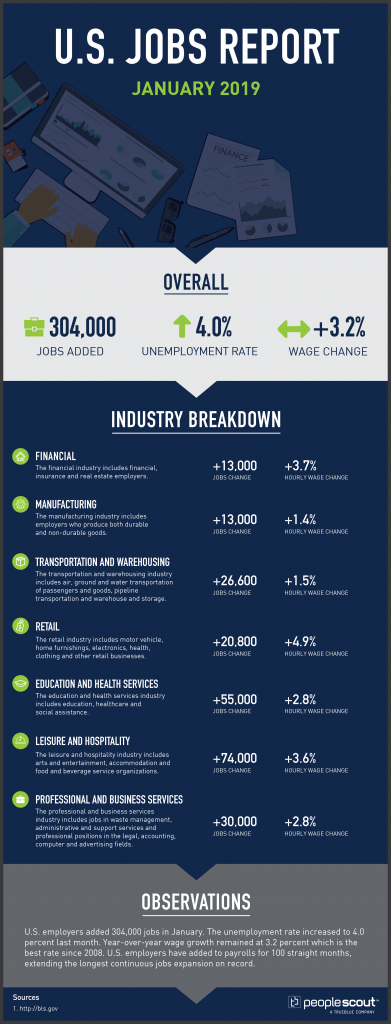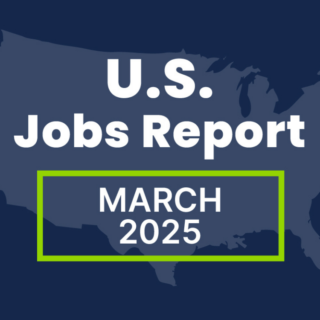The Labor Department released its January 2019 Jobs Report which shows that U.S. employers added 304,000 jobs in January. The unemployment rate increased to 4.0% last month. Year-over-year wage growth remained at 3.2%, the best rate since the end of the recession. U.S. employers have added to payrolls for 100 straight months, extending the longest continuous jobs expansion on record.

The Numbers
304,000: The economy added 304,000 jobs in January.
4.0%: The unemployment increased to 4.0%.
3.2%: Wages remained at 3.2% growth over the last year.
The Good
The 304,000 jobs added beat analyst expectations and is notably higher than the average monthly job increase in 2018 which was 223,000. Wage gains remained steady at 3.2%, which is comfortably ahead of the rate of inflation. The participation rate, the measure of those who are part of the nation’s workforce, rose slightly to 63.2%, half a percentage point over January 2018’s 62.7%. This is the highest level of participation since 2013.
Jobs were created in several key sectors including Hospitality and Leisure at 74,000 and Education and Health Services at 55,000. 26,600 jobs were added to the Transportation and Warehousing sector while 20,800 new positions were created in the Retail sector.
The positive reception of January’s report by economists and analysts is summed up well by the Chief Investment Strategist of State Street Global Advisors quoted in Reuters:
“It’s great way to celebrate 100 consecutive months of jobs gains, which is a record. The report from top to bottom is very, very solid, top-line number beat. We did see average hourly numbers that continued to grow, but are not indicating any inflationary concerns that would cause the Fed to change its path on interest rates. Participation rate is the highest it’s been since 2013, and job gains were increasing pretty broad based across a lot of different categories, this jobs report is very, very solid.”
The Bad
The unemployment rate rose to 4.0% in part due to the federal government shutdown, the longest in U.S. history which ended on January 25. The increase was fueled by those unemployed Americans who classified themselves as being on a “temporary lay off” as reported by the New York Times:
“The shutdown does help explain why the unemployment rate ticked up to 4% in January. Unlike the monthly hiring figures, which come from a survey of employers and are based on their payrolls, the unemployment rate is based on a survey of households. In that survey, 175,000 more people than in the previous month reported themselves as being unemployed because of a “temporary layoff” — a total that included government workers.
“Where’s your shutdown impact? There it is,” said Brett Ryan, an economist for Deutsche Bank in New York. “It just showed up in the unemployment rate.”
January’s report also showed that the number of people who said they were employed part-time for economic reasons spiked by 490,000 to 5.15 million — 11 percent higher than December’s figures. While some of this increase may be attributed to government contractors who were not paid during the shutdown, it is an indicator that the full employment economy is not providing the necessary economic benefits for a large number of Americans.
The Unknown
While the long-term repercussions of the government shutdown are unclear, some career government employees worry that young people will no longer be attracted to working in the public sector, even in the traditionally competitive areas like diplomacy:
“I expect there will be some long-term repercussions of this [shutdown] in terms of really good people deciding this is not the career they signed up for,” one American diplomat posted in Europe who declined to be named said last week about younger people entering the foreign service.”
The repercussions may not be limited to those starting their careers opting out of the public sector and going into private enterprise. Current government workers who are discouraged by the recent shutdown may become a source of talent for the private sector in a very challenging labor market:
“In a tight job market, federal employees, many of whom are highly educated, would most likely not have a hard time finding other jobs. Jessica Klement, vice president of the National Active and Retired Federal Employees Association, says the effects of the shutdown on federal workers are likely to be long-lasting.
“Federal employees,” she says, “take great pride in the work that they do for the federal government. And every day for 35 days they turned on the television and were told, ‘You have nothing to worry about — you’re going to get back pay’ or ‘Are you even essential if you’re not working during this government shutdown?’ ”
That message, Klement says, will create “untold morale problems” that will play out over the next few “days, weeks and years.”



